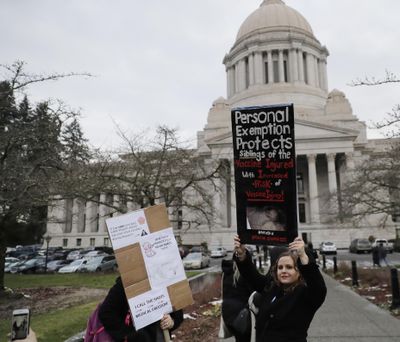Senate votes to end personal exemption for measles vaccine

OLYMPIA – An effort to save the personal exemption parents can use to keep their children from receiving the measles vaccine failed Wednesday night as the Senate narrowly voted to end that practice in Washington.
Senate Republicans tried to kill the proposal with a parliamentary stalling tactic, then tried to weaken it with amendments. In the end, lawmakers worked into the night to push the issue back to the House, which has already approved a different version of the bill.
“Let’s be clear. A vote against this bill is a vote against public health,” said Sen. Annette Cleveland, D-Vancouver, adding that the community has seen 73 cases of measles. “It’s a vote against the safety of our public spaces.”
Republicans questioned the safety of the vaccine and doubted the urgency of the change.
“If this is such an emergency, why does this bill not have an emergency clause,” Sen. Tim Sheldon, D-Hoodsport, referring to a requirement that would make the law take effect as soon as it was signed by the governor. As is, the bill would take effect 90 days after the session ends.
Under the latest version, the bill would keep medical and religious exemptions to receiving the measles, mumps and rubella, or MMR vaccine, but end the ability for parents to refuse to vaccinate their children to attend public school for personal or philosophical reasons.
Supporters of the personal exemption, not available in some states, flooded committee hearings on the proposal and generated demonstrations on the Capitol Campus. They disputed claims of physicians and public health officials that multiple studies have proved the vaccine safe, with children as well as adults carrying signs demanding the right to exercise their right to make choices on health care. Senators said their offices have been flooded with emails, letters and calls from people demanding the state keep the personal exemption.
Sen. Lisa Wellman, D-Mercer Island, argued most people support the vaccines and the opponents were a “just a small, loud group of people and I am not going to respond to their fantasies.”
That brought an objection from Sen. Mark Schoesler, R-Ritzville: “These people care, they’re compassionate and their views should be respected.”
Sen. Shelly Short, R-Addy, said the state should preserve the personal exemption, which she called “a constitutionally protected individual right.”
But Democrats argued the rights of the public, particularly infants and people with compromised immune systems, should be protected from highly contagious diseases that can be prevented by vaccines.
Before the bill could be debated, however, Republicans tried to kill it by stalling its introduction as one of the key deadlines for voting on bills approached. Debate on the bill had to start before 4:55 p.m., when the previously announced last bill of the day on a new psychiatric teaching hospital was set to begin. As the clock ticked toward that time, however, Republicans dragged out the vote on another bill, leaving the floor during the roll call, and forcing their names to be called later, and announcing their vote slowly.
They also made other motions that stopped the proceedings until 4:54 p.m., at which time the number and title of the vaccine bill began to be announced. A minute later, the Senate had to switch to the teaching hospital bill. Democrats initially thought that not enough of the vaccine bill was announced, and that the proposal was dead.
The Senate then went into recess after voting on the hospital bill.
During the break, Lt. Gov. Cyrus Habib, who was presiding over the chamber, said he believed enough of the vaccine bill had been heard to allow for a debate. Senators and parliamentary attorneys listened to the tape and said enough was read to allow debate to begin. After some 18 GOP amendments were voted down by Democrats, the bill passed with the minimum votes needed.